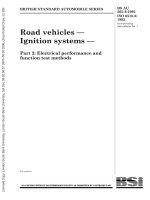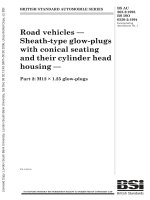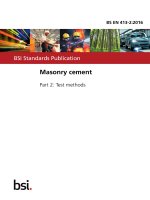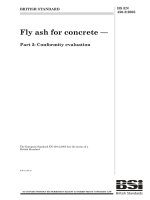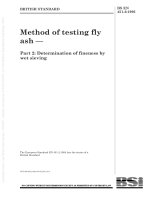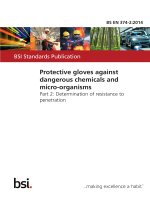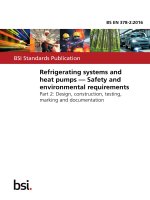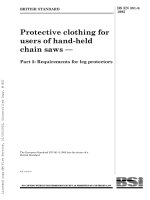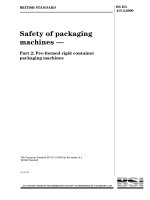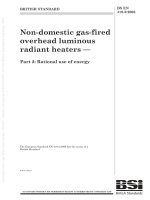Bsi bs en 00729 2 1995 (1998)
Bạn đang xem bản rút gọn của tài liệu. Xem và tải ngay bản đầy đủ của tài liệu tại đây (362.39 KB, 15 trang )
British Standard
Licensed Copy: , University of Newcastle, 28 November 2003, Uncontrolled Copy, (c) BSI
A single copy of this British Standard is licensed to
28 November 2003
This is an uncontrolled copy. Ensure use of the most
current version of this document by searching British
Standards Online at bsonline.techindex.co.uk
BRITISH STANDARD
Quality requirements
for welding —
Fusion welding of
metallic materials —
Licensed Copy: , University of Newcastle, 28 November 2003, Uncontrolled Copy, (c) BSI
Part 2: Comprehensive quality
requirements
The European Standard EN 729-2:1994 has the status of a
British Standard
UDC 621.791.5:669:658.562
BS EN
729-2:1995
BS EN 729-2:1995
Cooperating organizations
Licensed Copy: , University of Newcastle, 28 November 2003, Uncontrolled Copy, (c) BSI
The European Committee for Standardization (CEN), under whose supervision
this European Standard was prepared, comprises the national standards
organizations of the following countries:
Austria
Belgium
Denmark
Finland
France
Germany
Greece
Iceland
Ireland
Italy
Luxembourg
Netherlands
Norway
Portugal
Spain
Sweden
Switzerland
United Kingdom
This British Standard, having
been prepared under the
direction of the Engineering
Sector Board, was published
under the authority of the
Standards Board and comes into
effect on
15 January 1995
© BSI 12-1998
The following BSI references
relate to the work on this
standard:
Committee reference WEE/-/1/6
Draft for comment 92/75857 DC
ISBN 0 580 23132 1
Oesterreichisches Normungsinstitut
Institut belge de normalisation
Dansk Standard
Suomen Standardisoimisliito, r.y.
Association franỗaise de normalisation
Deutsches Institut für Normung e.V.
Hellenic Organization for Standardization
Technological Institute of Iceland
National Standards Authority of Ireland
Ente Nazionale Italiano di Unificazione
Inspection du Travail et des Mines
Nederlands Normalisatie-instituut
Norges Standardiseringsforbund
Instituto Portugs da Qualidade
Asociación Espola de Normalización y Certificación
Standardiseringskommissionen i Sverige
Association suisse de normalisation
British Standards Institution
Amendments issued since publication
Amd. No.
Date
Comments
BS EN 729-2:1995
Contents
Cooperating organizations
National foreword
Foreword
Text of EN 729-2
Licensed Copy: , University of Newcastle, 28 November 2003, Uncontrolled Copy, (c) BSI
National annex NA (informative) Committees responsible
National annex NB (informative) Cross-references
© BSI 12-1998
Page
Inside front cover
ii
2
3
Inside back cover
Inside back cover
i
BS EN 729-2:1995
National foreword
This British Standard has been prepared under the direction of the Engineering
Sector Board and is the English language version of EN 729-2:1994 Quality
requirements for welding — Fusion welding of metallic materials —
Part 2: Comprehensive quality requirements, published by the European
Committee for Standardization (CEN).
EN 729-2 was produced as the result of international discussion in which the UK
took an active part.
There has previously been no direct British Standard equivalent to this standard.
Application Standards may request the manufacturer to comply with one of the
Parts of EN 729.
It is assumed that the execution of the provisions of this document is entrusted to
suitably qualified and experienced persons.
A British Standard does not purport to include all the necessary provisions of a
contract. Users of British Standards are responsible for their correct application.
Licensed Copy: , University of Newcastle, 28 November 2003, Uncontrolled Copy, (c) BSI
Compliance with a British Standard does not of itself confer immunity
from legal obligations.
Summary of pages
This document comprises a front cover, an inside front cover, pages i and ii,
the EN title page, pages 2 to 8, an inside back cover and a back cover.
This standard has been updated (see copyright date) and may have had
amendments incorporated. This will be indicated in the amendment table on
the inside front cover.
ii
© BSI 12-1998
EUROPEAN STANDARD
EN 729-2
NORME EUROPÉENNE
EUROPÄISCHE NORM
September 1994
UDC 621.791.5:669:658.562
Descriptors: Welding, fusion welding, welded constructions, metal products, quality, quality assurance, manufacturing
English version
Licensed Copy: , University of Newcastle, 28 November 2003, Uncontrolled Copy, (c) BSI
Quality requirements for welding — Fusion welding of
metallic materials —
Part 2: Comprehensive quality requirements
Exigences de qualité en soudage — Soudage
par fusion des matériaux métalliques —
Partie 2: Exigences de qualité complète
Schweitßtechnische Qualitätsanforderungen —
Schmelzschweißen metallischer Werkstoffe —
Teil 2: Umfassende Qualitätsanforderungen
This European Standard was approved by CEN on 1994-09-06. CEN members
are bound to comply with the CEN/CENELEC Internal Regulations which
stipulate the conditions for giving this European Standard the status of a
national standard without any alteration:
Up-to-date lists and bibliographical references concerning such national
standards may be obtained on application to the Central Secretariat or to any
CEN member.
This European Standard exists in three official versions (English, French,
German). A version in any other language made by translation under the
responsibility of a CEN member into its own language and notified to the
Central Secretariat has the same status as the official versions.
CEN members are the national standards bodies of Austria, Belgium,
Denmark, Finland, France, Germany, Greece, Iceland, Ireland, Italy,
Luxembourg, Netherlands, Norway, Portugal, Spain, Sweden, Switzerland and
United Kingdom.
CEN
European Committee for Standardization
Comité Européen de Normalisation
Europäisches Komitee für Normung
Central Secretariat: rue de Stassart 36, B-1050 Brussels
© 1994 Copyright reserved to CEN members
Ref. No. EN 729-2:1994 E
EN 729-2:1994
Licensed Copy: , University of Newcastle, 28 November 2003, Uncontrolled Copy, (c) BSI
Foreword
This European Standard was prepared by the
Technical Committee 121, Welding, of which the
secretariat is held by DS.
CEN/TC 121 decided to submit this final draft to the
formal vote by its resolution 173/1993. The result
was positive.
EN 729 is composed of the four following parts:
— EN 729-1, Quality requirements for welding —
Fusion welding of metallic materials —
Part 1: Guidelines for selection and use;
— EN 729-2, Quality requirements for welding —
Fusion welding of metallic materials —
Part 2: Comprehensive quality requirements;
— EN 729-3, Quality requirements for welding —
Fusion welding of metallic materials —
Part 3: Standard quality requirements;
— EN 729-4, Quality requirements for welding —
Fusion welding of metallic materials —
Part 4: Elementary quality requirements.
This European Standard has been prepared under a
mandate given to CEN by the Commission of the
European Communities and the European Free
Trade Association, and supports essential
requirements of EC Directive(s).
This European Standard shall be given the status of
a national standard, either by publication of an
identical text or by endorsement, at the latest by
March 1995, and conflicting national standards
shall be withdrawn at the latest by March 1995.
According to the CEN/CENELEC Internal
Regulations, the following countries are bound to
implement this European Standard: Austria,
Belgium, Denmark, Finland, France, Germany,
Greece, Iceland, Ireland, Italy, Luxembourg,
Netherlands, Norway, Portugal, Spain, Sweden,
Switzerland and United Kingdom.
2
Contents
Foreword
1 Scope
2 Normative references
3 Definitions
4 Contract and design review
5 Subcontracting
6 Welding personnel
7 Inspection, testing and examination
personnel
8 Equipment
9 Welding activities
10 Welding consumables
11 Storage of parent materials
12 Post-weld heat treatment
13 Welding related inspection and testing
14 Non-conforming and corrective action
15 Calibration
16 Identification and traceability
17 Quality records
Page
2
3
3
4
4
5
5
5
5
6
7
7
7
7
8
8
8
8
© BSI 12-1998
Licensed Copy: , University of Newcastle, 28 November 2003, Uncontrolled Copy, (c) BSI
EN 729-2:1994
1 Scope
2 Normative references
This standard has been prepared such that:
— it is independent of the type of welded
construction to be manufactured;
— it defines quality requirements for welding
both in workshops and on site;
— it provides guidance for describing a
manufacturer’s capability to produce welded
constructions to meet specified requirements;
— it may also be used as a basis for assessing the
manufacturer in respect to his welding capability.
The standard is appropriate when demonstration of
a manufacturer’s capability to produce welded
construction, fulfilling specified quality
requirements, are specified in one or more of the
following:
— a contract between involved parties;
— an application standard;
— a regulatory requirement.
The requirements contained within this standard
may be adopted in full or may be selectively deleted
by the manufacturer if not applicable to the
construction concerned. They provide a flexible
framework for the control of welding in the following
cases:
— Case 1
To provide specific requirements for fusion
welding in contracts which require the
manufacturer to have a quality system in
accordance with EN 29001 or EN 29002.
— Case 2
To provide specific requirements for fusion
welding in contracts which require the
manufacturer to have a quality system other
than EN 29001 or EN 29002.
— Case 3
To provide specific requirements for fusion
welding as guidance to a manufacturer
developing a quality system.
— Case 4
To provide specific requirements for references in
application standards which uses fusion welding
as part of its requirements or in a contract
between relevant parties. It may however be
more appropriate for EN 729-3 or EN 729-4 to be
used in such cases.
This European Standard incorporates by dated or
undated reference, provisions from other
publications. These normative references are cited
at the appropriate places in the text and the
publications are listed hereafter.
For dated references, subsequent amendments to or
revisions of any of these publications apply to this
European Standard only when incorporated in it by
amendment or revision. For undated references the
latest edition of the publication referred to applies.
EN 287-1, Approval testing of welders — Fusion
welding — Part 1: Steels.
EN 287-2, Approval testing of welders — Fusion
welding — Part 2: Aluminium and aluminium
alloys.
EN 288-1, Specification and approval of welding
procedures for metallic materials —
Part 1: General rules.
EN 288-2, Specification and approval of welding
procedures for metallic materials —
Part 2: Welding procedure specification for arc
welding.
EN 288-3, Specification and approval of welding
procedures for metallic materials —
Part 3: Welding procedure tests for arc welding of
steels.
EN 288-4, Specification and approval of welding
procedures for metallic materials —
Part 4: Welding procedure tests for arc welding of
aluminium and its alloys.
EN 288-5, Specification and qualification of welding
procedures for metallic materials —
Part 5: Approval by using approved welding
consumables for arc welding.
EN 288-6, Specification and qualification of welding
procedures for metallic materials —
Part 6: Approval related to previous experience.
EN 473, Non-destructive testing — Qualification
and certification of personnel.
EN 719, Welding coordination — Tasks and
responsibilities.
EN 729-1, Quality requirements for welding —
Fusion welding of metallic materials —
Part 1: Guidelines for selection and use.
EN 729-3, Quality requirements for welding —
Fusion welding of metallic materials —
Part 3: Standard quality requirements.
© BSI 12-1998
3
EN 729-2:1994
Licensed Copy: , University of Newcastle, 28 November 2003, Uncontrolled Copy, (c) BSI
EN 729-4, Quality requirements for welding —
Fusion welding of metallic materials —
Part 4: Elementary quality requirements.
prEN 1258, Welding — Measurement of preheating
temperature, interpass temperature and preheat
maintenance temperature during welding.
prEN 1418, Welding personnel — Approval testing
of welding personnel for fully mechanized and
automatic welding of metallic materials.
EN 29001:1987, Quality systems — Model for
quality assurance in design development,
production, installation and servicing.
EN 29002:1987, Quality systems — Model for
quality assurance in production and installation.
EN 29692:1994, Metal-arc welding with covered
electrode, gas-shielded metal-arc welding and gas
welding — Joint preparations for steels.
3 Definitions
For the purposes of this standard, definitions listed
in EN 729-1 apply.
4 Contract and design review
4.1 General
The manufacturer shall review the contractual
requirements and the design data provided by the
purchaser or in-house data for construction
designed by the manufacturer. This is to ensure that
all information necessary to carry out the
fabrication operations is available prior to the
commencement of the work. The manufacturer shall
affirm his capability to meet all welding contract
requirements and ensure adequate planning of all
quality related activities.
Contract review is carried out by the manufacturer
to verify that the contract is within his capability to
perform, that sufficient resources are available to
achieve delivery schedules and that documentation
is clear and unambiguous. The manufacturer should
ensure any variations between the contract and
previous tender documentation are identified and
the purchaser notified of any programme, cost or
engineering changes that may result.
The items in 4.2 are typically considered at or before
the time of the contract review. The items in 4.3
usually form part of the design review and should be
taken into account during the contract review if the
design is not carried out by the fabricator. It shall be
ensured that all relevant information has been
supplied by the purchaser.
When the contract does not exist, e.g. items made for
stock, the manufacturer is required to take into
consideration the requirements of 4.2 whilst
carrying out his design review (4.3).
4
4.2 Application — Contract review
Contractual requirements to be considered should
include:
a) the application standard to be used, together
with any supplementary requirements;
b) the specification of welding procedures,
non-destructive testing procedures and heat
treatment procedures;
c) the approach to be used for welding procedure
approval;
d) the approval of personnel;
e) post-weld heat treatment;
f) inspection and testing;
g) selection, identification and/or traceability,
e.g. for materials, welders and welds
(see clause 16);
h) quality control arrangements, including any
involvement of an independent inspection body;
i) other welding requirements, e.g. batch testing
of consumables, ferrite content of weld metal,
ageing, hydrogen content;
j) environmental conditions relevant to welding
on site, e.g. very low temperature ambient
conditions or any necessity to provide protection
against adverse weather conditions;
k) subcontracting;
l) handling of non-conformances.
4.3 Application — Design review
Design requirements to be considered should
include:
a) location, accessibility and sequence of all
welds;
b) surface finish and the weld profile;
c) parent metal(s) specification and welded joint
properties;
d) permanent backing;
e) welds which are to be made in the workshop, or
elsewhere;
f) dimensions and details of joint preparation and
completed joint;
g) use of special methods, e.g. to achieve full
penetration without backing when welded from
one side only;
h) quality and acceptance requirements for
welds;
i) other special requirements, e.g. acceptability of
peening, heat treatment.
© BSI 12-1998
EN 729-2:1994
Licensed Copy: , University of Newcastle, 28 November 2003, Uncontrolled Copy, (c) BSI
5 Subcontracting
When a manufacturer intends to use subcontracted
services (e.g. welding, inspection, non-destructive
testing, heat treatment) all relevant specifications
and requirements shall be supplied by the
manufacturer to the subcontractor. The
subcontractor shall provide such records and
documentation of his work as may be specified by
the manufacturer.
Any subcontractor shall work under the order and
responsibility of the manufacturer and shall fully
comply with the relevant requirements of this
standard. The manufacturer shall ensure that the
subcontractor can comply with the quality
requirements of the contract.
The information to be provided by the manufacturer
to the subcontractor shall include all relevant data
from the contract review (see 4.2) and the design
review (see 4.3). Additional requirements may need
to be specified if the design of a structure is to be
subcontracted.
7 Inspection, testing and examination
personnel
7.1 General
The manufacturer shall have at his disposal
sufficient and competent personnel for planning and
performing, for supervising, inspection, testing and
examination of the welding production according to
specified requirements.
7.2 Non-destructive testing personnel
The non-destructive testing personnel shall be
approved according to EN 473.
8 Equipment
8.1 Production and testing facilities
All welders and welding operators shall be approved
by an appropriate test according to the relevant part
of EN 287 or EN 1418. All records of approval shall
be maintained up to date.
The following equipment shall be available when
necessary:
— welding power sources and other machines;
— equipment for joint preparation and cutting,
including thermal cutting;
— equipment for preheating and post-weld heat
treatment including temperature indicator;
— jigs and fixtures;
— cranes and handling equipment used for
welding production;
— personal protective equipment and other
safety equipment, directly associated with
welding;
— ovens, quivers etc. used for treatment of
welding consumables;
— cleaning facilities;
— destructive and non-destructive testing
facilities.
6.3 Welding coordination personnel
8.2 Description of facilities
The manufacturer shall have at his disposal
appropriate welding coordination personnel
according to EN 719 such that the welding
personnel can be supplied with the necessary
welding procedure specifications or work
instructions and that the work can be properly
performed and controlled. Such persons having
responsibility for quality activities shall have
sufficient authority to enable any necessary action
to be taken. The duties, inter-relationships and
limits of responsibility of such persons should be
clearly defined.
The manufacturer shall maintain a list of essential
equipment, used for welding production. This list
shall identify items of major equipment, essential
for an evaluation of workshop capacity and
capability. This includes for example:
— capacity of largest cranes;
— size of components the workshop is able to
handle;
— capability of mechanised or automatic welding
equipment;
— dimensions and maximum temperature of
furnaces for post-weld heat treatment;
— capacities of rolling, bending and cutting
equipment.
6 Welding personnel
6.1 General
The manufacturer shall have at his disposal
sufficient and competent personnel for the planning,
performing, supervising and examining of the
welding production according to specified
requirements.
6.2 Welders
© BSI 12-1998
5
EN 729-2:1994
Other equipment only needs to be specified by
approximate total numbers which cover each
general type (e.g. total number of power sources for
the different welding processes).
8.3 Suitability of equipment
The equipment shall be adequate for the application
concerned. Approval of welding and heating
equipment is not normally required unless specified
in the contract.
8.4 New equipment
After installation of new (or refurbished) equipment
appropriate tests of the equipment shall be
performed. The tests shall verify the correct
function of the equipment. The tests shall be
carrried out in accordance with appropriate
standards, whenever relevant. Records shall be
maintained of such tests.
Licensed Copy: , University of Newcastle, 28 November 2003, Uncontrolled Copy, (c) BSI
8.5 Maintenance
The manufacturer shall have documented plans for
the maintenance of equipment. The plan shall
ensure maintenance checks for those features in the
equipment which controls variables listed in the
relevant welding procedure specifications. The
plans may be limited to those features (variables)
which are essential for assuring the quality of the
welded construction.
Examples of such features are as follows:
— condition of guides in equipment for thermal
cutting, mechanized welding fixtures etc.;
— condition of ammeters and volt meters, flow
meters etc. used for the operation of the welding
machines;
— condition of cables, hoses, connectors etc.;
— condition of control system in mechanised
and/or automatic welding equipment;
— condition of thermocouples and other
temperature measurement instruments;
— condition of wire feeders and conduits.
Defective equipment shall not be used.
9 Welding activities
9.1 Production plan
The manufacturer shall carry out adequate
production planning, compatible with facilities as
in 8.1. This shall include at least:
— specification of the sequence by which the
construction shall be manufactured, e.g. as single
parts or sub-assemblies, and the order of
subsequent final assembly;
— identification of the individual processes
required to manufacture the construction;
— reference to the appropriate procedure
specifications for welding and allied processes;
— sequence in which the welds are to be made, if
applicable;
— order and timing in which the individual
processes are to be performed;
— specification for inspection and testing,
including the involvement of any independent
inspection body;
— environment conditions, e.g. protection from
wind and rain;
— item identification by batches, components or
parts as appropriate.
9.2 Welding procedure specification (WPS)
The manufacturer shall prepare welding procedure
specification in accordance with EN 288-2 and shall
ensure that these are used correctly in production.
9.3 Welding procedure approval
Welding procedures shall be approved prior to
production in accordance with the appropriate part
of EN 288. The method of approval shall be in
accordance with the relevant application standards
or as stated in the contract.
Other procedures, e.g. procedure for heat treatment,
should only be approved if stated in the relevant
application standards and/or stated in the contract.
9.4 Work instructions
The manufacturer may use the welding procedure
specification directly in the, workshop for
instruction purposes to the welder. Alternatively, he
may use dedicated work instructions. Such
dedicated work instructions shall be prepared from
an approved welding procedure specification and do
not require separate approval (see EN 288-1).
6
© BSI 12-1998
EN 729-2:1994
9.5 Documentation
13.2 Inspection and testing before welding
The manufacturer shall establish and maintain
procedures for the control of relevant quality
documents, e.g. welding procedure specification,
welding procedure approval record, welder’s
approval certificate.
Before the start of welding, the following shall be
checked, when necessary:
— suitability and validity of welder’s approval
certificates (see appropriate part of EN 287
or EN 1418);
— suitability of welding procedure specification
(see appropriate part of EN 288);
— identity of parent metal;
— identity of welding consumables;
— joint preparation (e.g. shape and dimensions)
(see EN 29692);
— fit-up, jigging and tacking;
— any special requirements in welding procedure
specification, e.g. prevention of distortion;
— arrangement for any production test;
— suitability of working conditions for welding,
including environment.
10 Welding consumables
10.1 General
Responsibilities and procedures involved in the
control of welding consumables shall be specified by
the manufacturer.
10.2 Batch testing
Batch testing of consumables will be required only if
stated in the contract.
Licensed Copy: , University of Newcastle, 28 November 2003, Uncontrolled Copy, (c) BSI
10.3 Storage and handling
The manufacturer shall produce and implement
procedures for storage, handling and use of
consumables which avoid moisture pick-up,
oxidation, damage etc. The, procedures shall be in
accordance with the supplier’s recommendations.
11 Storage of parent materials
Storage shall be such that the material will not be
adversely affected. Identification shall be
maintained during storage.
12 Post-weld heat treatment
The manufacturer shall be fully responsible for the
specification and the performance of any post-weld
heat treatment. The procedure shall be compatible
with the parent metal, welded joint, construction
etc. and in accordance with the application standard
and/or specified requirements. A record of the heat
treatment shall be made during the process. The
record shall demonstrate that the specification has
been followed and shall be traceable to the
particular heat treatment operation.
13 Welding related inspection and
testing
13.1 General
Inspection and testing shall be implemented at
appropriate points in the manufacturing process to
assure conformity with contract requirements.
Location and frequency of such inspection and/or
testing will depend on the contract and/or
application standard, the welding process and the
type of construction (see 4.2 and 4.3).
The manufacturer may carry out additional tests
without restriction. Reporting of such tests is not
required.
© BSI 12-1998
13.3 Inspection and testing during welding
During welding, the following shall be checked at
suitable intervals or by continuous parameter, when
necessary:
— essential welding parameters (e.g. welding
current, arc voltage and travel speed);
— preheating/interpass temperature
(see EN 1258);
— cleaning and shape of runs and layers of weld
metal;
— back gouging;
— welding sequence;
— correct use and handling of consumables;
— control of distortion;
— any intermediate examination, e.g. checking
dimensions.
13.4 Inspection and testing after welding
After welding, the compliance with relevant
acceptance criteria shall be checked, when
necessary:
— by visual inspection according to relevant EN
standards;
— by non-destructive testing according to
relevant EN standards;
— by destructive testing according to relevant
EN standards;
— form, shape and dimensions of the welded
construction;
— results and records of post-weld operations,
e.g. grinding, post-weld heat treatment, ageing.
7
EN 729-2:1994
13.5 Inspection and test status
Measures shall be taken as appropriate to indicate
e.g. by marking of the item or a routing card, the
status of inspection and test of the welded
construction.
Licensed Copy: , University of Newcastle, 28 November 2003, Uncontrolled Copy, (c) BSI
14 Non-conforming and corrective
action
Measures shall be implemented to control items
which do not conform to specified requirements in
order to prevent their inadvertent use. When repair
and/or rectification is undertaken by the
manufacturer, appropriate procedures shall be
available at all workstations where repair or
rectification is performed. When repair or
rectification is carried out, the items shall be
re-inspected, tested and examined in accordance
with the original requirements. Measures shall also
be implemented to ensure that conditions adverse to
quality of the, welded construction are promptly
identified and corrected.
15 Calibration
The manufacturer shall be responsible for the
appropriate calibration of inspection, measuring
and testing equipment. All equipment used to
assess the quality of the welded construction shall
be suitably controlled and shall be calibrated at
specified intervals.
16 Identification and traceability
Identification and traceability shall be maintained
throughout the manufacturing process, where
appropriate.
Documented systems to ensure identification and
traceability of welding operations should include,
when necessary:
— production plans;
— routing cards;
— records of weld locations in structure;
8
— weld marking, stamping, labels etc.;
— traceability (for fully mechanized and
automatic weld-equipment including welder and
welding operator) to specific welds;
— welder and procedure approvals;
— non-destructive testing procedures and
personnel;
— welding consumables, e.g. type, batch or cast
numbers;
— parent metal, e.g. type, batch;
— location or repairs.
17 Quality records
Quality records, according to the contract
requirements, should include, when necessary:
— record of contract/design review;
— material certificates;
— consumables certificates;
— welding procedure specification;
— welder or welding operator approval
certificates;
— non-destructive testing personnel certificates;
— heat treatment and procedure specification
records;
— non-destructive testing and destructive testing
procedures and reports;
— dimensional reports;
— records of repairs and other non-conformity
reports.
Quality records shall be retained for a minimum
period of 5 years in the absence of any other
specified requirements.
© BSI 12-1998
BS EN 729-2:1995
National annex NA (informative)
Committees responsible
The United Kingdom participation in the preparation of this European Standard was entrusted by the
Engineering Sector Board to Technical Committee WEE/-/1/6 upon which the following bodies were
represented:
Associated Offices Technical Committee
British Constructional Steelwork Association Ltd.
British Railways Board
Electricity Association
Institute of Quality Assurance
Power Generation Contractor’s Association (BEAMA Ltd.)
Railway Industry Association of Great Britian
Welding Manufacturers’ Association (BEAMA Ltd.)
National annex NB (informative)
Cross-references
Licensed Copy: , University of Newcastle, 28 November 2003, Uncontrolled Copy, (c) BSI
Publication referred to
EN 287-1:1992
EN 287-2:1992
EN 288-1:1992
EN 288-2:1992
EN 288-3:1992
EN 288-4:1992
EN 288-5
EN 288-6
EN 473:1992
EN 719:1994
EN 729-1:1994
EN 729-3:1994
EN 729-4:1994
EN 29001:19872)
EN 29002:19872)
EN 29692:19942)
1)
Corresponding British Standard
BS EN 287 Approval testing of welders for fusion welding
Part 1:1992 Steels
Part 2:1992 Aluminium and aluminium alloys
BS EN 288 Specification and approval of welding procedures for metallic
materials
Part 1:1992 General rules
Part 2:1992 Welding procedures specification for arc welding
Part 3:1992 Welding procedure tests for arc welding of steels
Part 4:1992 Welding procedure tests for arc welding of aluminium and its alloys
Part 51) Approval by using approved welding consumables for arc welding
Part 61) Approval related to previous experience
BS EN 473:1993 General principles for qualification and certification of NDT
personnel
BS EN 719:1994 Welding coordination — tasks and responsibilities
BS EN 729 Quality requirements for welding
Part 1:1995 Guidelines for selection and use
Part 3:1995 Standard quality requirements
Part 4:1995 Elementary quality requirements
BS 5750 Quality systems
Part 1:1987 Specification for design/development, production, installation and
servicing
Part 2:1987 Specification for production and installation
BS EN 29692:1994 Metal-arc welding with covered electrode, gas-shielded
metal-arc and gas welding; joint preparation for steels
In preparation.
2)
EN 29001:1987 and EN 29002:1987 have been superseded by EN ISO 9001:1994 and EN ISO 9002:1994 respectively which
have been implemented as BS EN ISO 9001:1994 and BS EN ISO 9002:1994 respectively.
© BSI 12-1998
Licensed Copy: , University of Newcastle, 28 November 2003, Uncontrolled Copy, (c) BSI
BSI
389 Chiswick High Road
London
W4 4AL
|
|
|
|
|
|
|
|
|
|
|
|
|
|
|
|
|
|
|
|
|
|
|
|
|
|
|
|
|
|
|
|
|
|
|
|
|
|
|
|
|
|
|
|
|
|
|
|
|
|
|
|
|
|
|
|
|
|
|
|
|
|
|
|
|
|
|
|
|
|
|
|
|
|
|
|
|
|
|
|
|
|
|
|
|
|
|
|
|
|
|
|
|
|
|
|
|
|
|
|
|
|
|
|
|
|
|
|
|
|
|
|
|
|
|
|
|
|
|
|
|
|
|
|
|
|
|
BSI Ð British Standards Institution
BSI is the independent national body responsible for preparing British Standards. It
presents the UK view on standards in Europe and at the international level. It is
incorporated by Royal Charter.
Revisions
British Standards are updated by amendment or revision. Users of British Standards
should make sure that they possess the latest amendments or editions.
It is the constant aim of BSI to improve the quality of our products and services. We
would be grateful if anyone finding an inaccuracy or ambiguity while using this
British Standard would inform the Secretary of the technical committee responsible,
the identity of which can be found on the inside front cover. Tel: 020 8996 9000.
Fax: 020 8996 7400.
BSI offers members an individual updating service called PLUS which ensures that
subscribers automatically receive the latest editions of standards.
Buying standards
Orders for all BSI, international and foreign standards publications should be
addressed to Customer Services. Tel: 020 8996 9001. Fax: 020 8996 7001.
In response to orders for international standards, it is BSI policy to supply the BSI
implementation of those that have been published as British Standards, unless
otherwise requested.
Information on standards
BSI provides a wide range of information on national, European and international
standards through its Library and its Technical Help to Exporters Service. Various
BSI electronic information services are also available which give details on all its
products and services. Contact the Information Centre. Tel: 020 8996 7111.
Fax: 020 8996 7048.
Subscribing members of BSI are kept up to date with standards developments and
receive substantial discounts on the purchase price of standards. For details of
these and other benefits contact Membership Administration. Tel: 020 8996 7002.
Fax: 020 8996 7001.
Copyright
Copyright subsists in all BSI publications. BSI also holds the copyright, in the UK, of
the publications of the international standardization bodies. Except as permitted
under the Copyright, Designs and Patents Act 1988 no extract may be reproduced,
stored in a retrieval system or transmitted in any form or by any means ± electronic,
photocopying, recording or otherwise ± without prior written permission from BSI.
This does not preclude the free use, in the course of implementing the standard, of
necessary details such as symbols, and size, type or grade designations. If these
details are to be used for any other purpose than implementation then the prior
written permission of BSI must be obtained.
If permission is granted, the terms may include royalty payments or a licensing
agreement. Details and advice can be obtained from the Copyright Manager.
Tel: 020 8996 7070.
